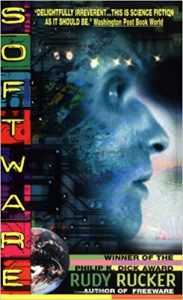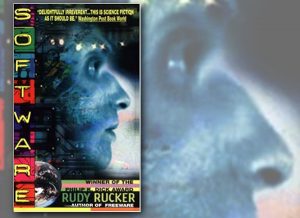SOFTWARE by Rudy Rucker (BOOK REVIEW)
“Intellectually he had always known it was possible. A robot, or a person, has two parts: hardware and software. The hardware is the actual physical material involved, and the software is the pattern in which the material is arranged. Your brain is hardware, but the information in the brain is software. The mind … memories, habits, opinions, skills … is all software.”
 Software is the first book in Rudy Rucker’s Ware tetralogy, a pioneering work of cyberpunk fiction, and the winner of the first ever Philip K. Dick award. Almost forty years later, it remains as deliriously inventive and delightfully bonkers as it was when it was released. The novel is an early exploration of the cyberpunk idea of uploading one’s consciousness, a gloriously weird take on robots and artificial intelligence, and a gonzo punk rollercoaster ride that draws equally from Rucker’s interest in advanced mathematics and higher dimensions and his concept of transrealism, through which Rucker draws explicitly on his lived experience to drive his science fiction. Software crams a dizzying array of ideas into its short length, and with its joyous anarchy and bonkers humour is a fine introduction to Rucker’s immediately identifiable writing style.
Software is the first book in Rudy Rucker’s Ware tetralogy, a pioneering work of cyberpunk fiction, and the winner of the first ever Philip K. Dick award. Almost forty years later, it remains as deliriously inventive and delightfully bonkers as it was when it was released. The novel is an early exploration of the cyberpunk idea of uploading one’s consciousness, a gloriously weird take on robots and artificial intelligence, and a gonzo punk rollercoaster ride that draws equally from Rucker’s interest in advanced mathematics and higher dimensions and his concept of transrealism, through which Rucker draws explicitly on his lived experience to drive his science fiction. Software crams a dizzying array of ideas into its short length, and with its joyous anarchy and bonkers humour is a fine introduction to Rucker’s immediately identifiable writing style.
Software is the story of Cobb Anderson, the man who invented the boppers, the first intelligent robots. The boppers have rebelled against their human controllers and have been exiled to the moon, and Cobb, now in his sixties, is a washed up pheazer, a “freaky geezer” living out his last days in a resort in Florida and drinking himself to oblivion rather than facing the end. The boppers realise that Cobb is responsible for imbuing them with free will, and want to return the favour by giving him a new improved robotic body so that he can cheat death. The only catch is that the process of uploading Cobb’s mind into a computer requires the destruction of his brain. Meanwhile stoner drop-out Sta-Hi Mooney finds himself accompanying Cobb on his trip to the moon to see the boppers, and becomes embroiled in the bopper revolution. The big boppers – giant supercomputers on the moon – have a plan for consuming bopper and human brains, and Sta-Hi and the rest of the boppers must stop them before all consciousness is absorbed into one.
The central dilemma of the novel revolves around the concept of mind uploading, a relatively unexplored subject when Rucker wrote the book. Cobb’s brain can be uploaded into a new robot body, freeing him from ageing, death and decay which plague the human body, and opening up a whole realm of posthuman existence, in which the body and its experiences can be programmed to order. However, in order to fully map Cobb’s mind, the boppers will need to dissect Cobb’s brain neuron by neuron and chemically extract the memories from amino acid codes. In the process of transferring the data to a new medium, Cobb’s brain will be destroyed. Will Cobb’s consciousness be transferred across, or is the new Cobb a copy that shares the same memories and thought processes as the original and therefore is under the delusion that he is the same person? Rucker leaves this dilemma unsolved for the reader to ponder. The new Cobb inhabiting his fresh new robot body certainly believes he is the same person, but Sta-Hi, who saw Cobb’s brain been dissected on the moon, is convinced that he saw Cobb die. Certainly it benefits the boppers to have robots indistinguishable from humans running around on Earth, and the Little Kidders, a gang of delinquents who attempt to eat Sta-Hi’s brain so they can extract its software, have no qualms about the damage they do to the original human bodies. Software revels in this Philip K. Dickian paranoia, where not even the uploaded humans can be sure they are the same person they started out as, and the robot bodies appear indistinguishable from their human counterparts, making the novel a very appropriate inaugural winner of the award carrying that author’s name.
Software is also an excellent robot novel, thanks to the charming, nonhuman boppers. Rucker’s central idea around artificial intelligence is that while humans may not be able to build intelligent self-aware robots by themselves, they could set up the conditions via which intelligent robots could evolve. As Cobb says,
“No one can write a bopper program … they’re too complicated. So instead I set thousands of simple AI programs loose in there … There were lots of … fitness tests, with the weaker programs getting wiped. And every so often all the surviving programs were randomly changed … mutated. I even provided for a sort of … sexual reproduction where two programs could merge.”
Thus Cobb is able to encourage the emergence of intelligence and self-awareness in the boppers, mimicking the chaotic and relentless progression of biological evolution in all its glorious messiness. The boppers are delightfully strange, taking all sorts of different shapes from giant multi-legged centipedes to digging machines to buildings, and all are wonderfully contemptuous of the “Asimov priorities” that are supposed to make them subservient to humans. In their chaotic diversity they represent all the open possibilities of posthuman embodiment.
The other thing that immediately strikes the reader about Software is Rucker’s distinctive humour. A huge fan of rock and roll and the Beat poets, Rucker brings his 60s countercultural outlook and zany worldview to science fiction. Rucker cites William Burroughs and Jack Kerouac as influences as important to him as Philip K. Dick and Robert Sheckley, and a love of wordplay and mythologising his own life infuses his work. His characters drink, do drugs and have casual sex, listen to rock and roll, and make mistakes as often as they get things right. Cobb Anderson, the bopper’s father figure, is loosely based on Rucker’s own father. Underlying all of this is Rucker’s fascination with mathematics, and his knowledge of advanced mathematical processes gives him an insight into the process of computer programming that many of the other early cyberpunk writers lacked. His playful approach to mathematics recalls the mathematical games and riddles that underpin Lewis Carroll’s Alice’s Adventures In Wonderland (1865) and Through The Looking-Glass (1871), as well as Edwin A. Abbot’s Flatland (1884). It is this playful approach to speculative fiction and his own life, underpinned by serious theoretical thought experiments, that gives Rucker’s writing its unique flavour and makes his work stand out in the field of cyberpunk.

